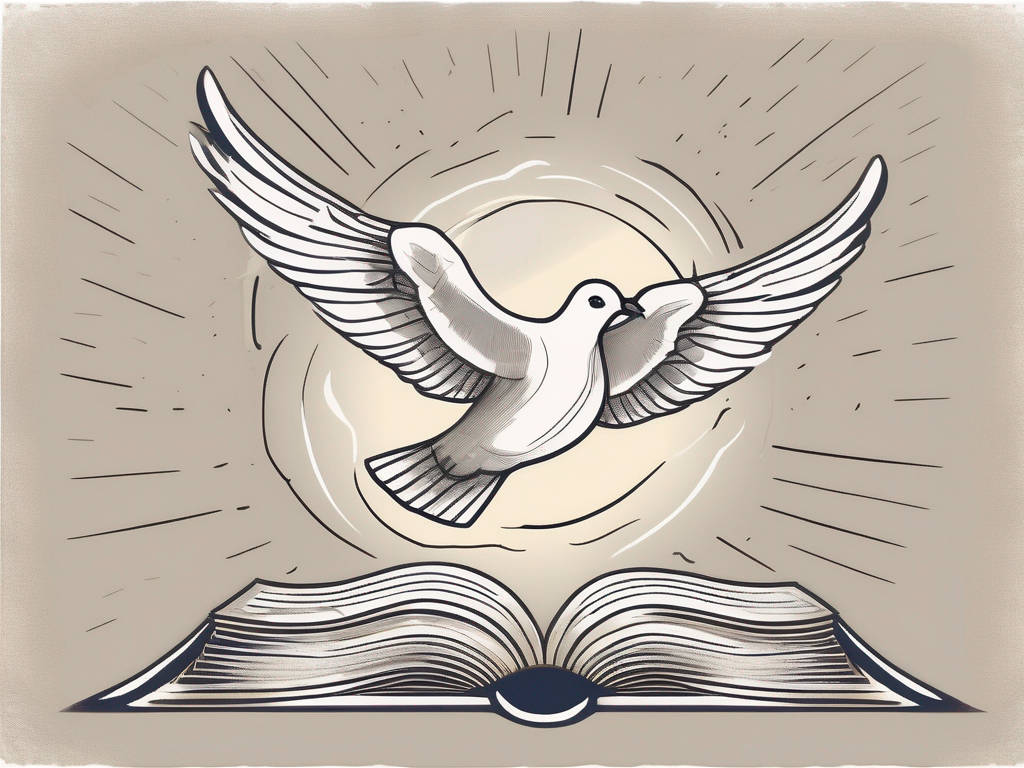In today’s diverse and multicultural world, religion remains a topic of immense interest and debate. One area that often sparks discussion is the difference between Christianity and Born Again Christianity. Are they the same thing? Are they completely different? What sets them apart? In this article, we will explore the nuances and distinctions between these two faiths to help you better understand the difference.
Defining Christianity: Core Beliefs and Practices
Before delving into the specifics of Born Again Christianity, it’s essential to grasp the foundations of Christianity as a whole. With roughly 2.3 billion followers, it is the largest religion in the world. At its core, Christianity centers around the belief in Jesus Christ as the Son of God and Savior of humanity.
Christians hold a range of beliefs, but the central tenets include the Trinity (the belief in one God in three persons: Father, Son, and Holy Spirit), the authority of the Bible as God’s Word, and the concept of salvation through faith in Jesus’ death and resurrection. The worship practices vary among different Christian denominations, but include prayer, sacraments such as baptism and communion, and regular gathering for worship.
Christianity is a faith with a rich history and diverse traditions. Its origin can be traced back to first century Palestine, when Jesus Christ preached and started a movement that would eventually become a global faith. Over the centuries, Christianity evolved into various branches and denominations, each with its own interpretations and traditions.
One of the oldest and largest Christian denominations is the Catholic Church. With its hierarchical structure and sacramental rituals, Catholicism has played a significant role in shaping the development of Christianity. On the other hand, Protestant denominations such as Lutheranism or Anglicanism emerged as a result of the Reformation, which challenged certain practices and doctrines of the Catholic Church.
Christianity, as a whole, emphasizes principles such as love, forgiveness, and compassion. The teachings of Jesus Christ serve as a moral compass for believers, guiding them in their daily lives. The Golden Rule, “Do unto others as you would have them do unto you,” encapsulates the spirit of Christian ethics.
Christianity also places great importance on community and reminds its followers to care for one another and the wider world. Charity and acts of service are encouraged, as Christians strive to reflect the love and grace they believe God has shown them. Through these acts, believers seek to make a positive impact on society and bring about social justice.
When exploring the differences between Christianity and Born Again Christianity, it becomes evident that while they share many core beliefs, there are also distinct practices and interpretations that set them apart. Born Again Christians place a strong emphasis on personal conversion and having a personal relationship with Jesus Christ. They often emphasize the experience of being “born again” through faith in Jesus as a transformative event in their lives.
Overall, Christianity is a diverse and dynamic faith that has shaped the lives of billions of people throughout history. Its core beliefs and practices continue to inspire and guide individuals in their spiritual journeys, providing a framework for understanding the world and their place in it.
Unraveling the Concept of Born Again Christianity
Born Again Christianity is a specific subset within Christianity. While all Born Again Christians are Christians, not all Christians identify as Born Again. Understanding the concept of being “born again” requires exploring its biblical basis and the transformation process it entails.
The Biblical Basis of Being Born Again
Born Again Christianity finds its roots in John 3:3, where Jesus tells Nicodemus, a Jewish leader, that “unless one is born again, he cannot see the kingdom of God.” Born Again Christians interpret this verse as a call to experience a spiritual rebirth. They believe that by accepting Jesus Christ as their Lord and Savior, they are spiritually born anew, leaving behind their old lives and embracing a new life in Christ.
This concept of being born again is not limited to just one verse in the Bible. Throughout the New Testament, there are several references to the idea of spiritual rebirth. In 2 Corinthians 5:17, the apostle Paul writes, “Therefore, if anyone is in Christ, the new creation has come: The old has gone, the new is here!” This verse further emphasizes the transformative nature of being born again, highlighting the idea that a person becomes a new creation in Christ.
For Born Again Christians, being born again represents a personal, transformative encounter with God’s grace that leads to a renewed faith and commitment to live according to Biblical teachings. It is not just a symbolic gesture or a mere intellectual acceptance of Jesus as the Son of God, but a deep and profound spiritual experience that shapes their entire lives.
The Transformation Process: Spiritual Rebirth
When a person identifies as a Born Again Christian, they often describe a profound transformation in their lives. This transformation stems from their belief that their old self has died and they have been spiritually reborn with a new identity in Christ. As a result, they strive to live a life dedicated to serving God and others. Born Again Christians often use phrases such as “accepting Jesus as their personal Lord and Savior” to describe this transformative experience.
The process of spiritual rebirth is not a one-time event for Born Again Christians. It is an ongoing journey of growth and transformation. They believe that the Holy Spirit works within them to continually shape their character, renew their minds, and conform them to the image of Christ. This process involves daily surrendering their will to God, seeking His guidance through prayer and studying the Bible, and actively participating in a community of believers who support and encourage one another.
Being born again also impacts the way Born Again Christians view the world and their purpose in it. They believe that they are called to be ambassadors for Christ, sharing His love and message of salvation with others. This often leads them to engage in evangelism and outreach activities, seeking to bring others into a personal relationship with Jesus Christ.
In conclusion, Born Again Christianity is a deeply transformative and personal experience rooted in the biblical concept of being born again. It involves accepting Jesus Christ as one’s Lord and Savior, experiencing a spiritual rebirth, and committing to a life dedicated to following Christ’s teachings. This journey of transformation is ongoing and shapes every aspect of a Born Again Christian’s life, leading them to live with a renewed sense of purpose and a desire to share the good news of Jesus with others.
Comparing and Contrasting Christianity and Born Again Christianity
While Born Again Christianity is a part of Christianity, there are distinct differences between the two. Let’s explore the commonalities as well as the factors that set them apart.
Similarities in Beliefs and Practices
Both Christianity and Born Again Christianity share many core beliefs and practices. Both emphasize a personal relationship with Jesus Christ, the authority of the Bible, and the concept of salvation through faith in Jesus’ sacrifice.
Worship practices, such as prayer and gathering for communal worship, are similar between the two as well. The teachings of Jesus serve as a guiding light for both Christians and Born Again Christians, influencing their actions and conduct.
However, it is important to note that within Christianity, there are various denominations and traditions that may have slight differences in their interpretation and emphasis on certain beliefs and practices. These differences can be seen in the rituals and customs followed by different Christian communities.
Distinct Differences in Interpretations and Rituals
One notable difference between Christianity and Born Again Christianity lies in how they interpret and understand their faith. While Christianity encompasses a wide range of denominations and traditions, Born Again Christianity tends to emphasize a more personal, experiential aspect of faith.
Born Again Christians often place a strong emphasis on the individual’s personal relationship with God and the transformative experience of being born again. This concept of being born again refers to a spiritual rebirth or conversion experience where an individual accepts Jesus Christ as their Lord and Savior, and their life is transformed by this encounter.
Some Born Again Christians also embrace specific practices, such as speaking in tongues or engaging in charismatic worship, that may not be as prevalent in other branches of Christianity. These practices are seen as manifestations of the Holy Spirit’s presence and power in their lives.
Furthermore, the emphasis on evangelism and spreading the message of salvation is often more pronounced in Born Again Christianity. Born Again Christians believe in the importance of sharing their faith and inviting others to experience the transformative power of Jesus Christ.
It is worth noting that while there are differences between Christianity and Born Again Christianity, these differences do not necessarily create a division or conflict between the two. Rather, they reflect the diversity and richness within the broader Christian faith.
Common Misconceptions about Born Again Christians
Unfortunately, misconceptions and stereotypes often surround Born Again Christianity. It is important to address these misunderstandings to foster a more accurate understanding and respect between believers of different faiths.
Debunking Stereotypes
One common misconception about Born Again Christians is that they are overly judgmental or self-righteous. While there may be individuals who exhibit these traits, it is not representative of the entire faith group. Born Again Christians, like all believers, are called to embrace humility, love, and acceptance of others.
It is crucial to recognize that Christianity, in its essence, teaches compassion and forgiveness. Born Again Christians strive to follow these teachings, understanding that judgment is not their role, but rather leaving it to God. They believe in the importance of treating others with kindness and respect, regardless of their beliefs or lifestyle choices.
Furthermore, Born Again Christians are not immune to making mistakes or falling short of their own ideals. They acknowledge their imperfections and rely on God’s grace and forgiveness to grow and learn from their experiences.
Clarifying Misunderstood Practices
Some practices within Born Again Christianity, such as speaking in tongues, may appear unfamiliar or even strange to those outside the faith. It is important to approach such practices with an open mind, seeking to understand their significance within the believers’ spiritual journey.
Speaking in tongues, also known as glossolalia, is considered a spiritual gift by Born Again Christians. It is a form of prayer or worship where individuals speak in a language that is unknown to them, but believed to be a direct communication with God. This practice is seen as a way to deepen one’s connection with the divine and to express emotions and thoughts that cannot be adequately conveyed through ordinary language.
It is important to note that not all Born Again Christians engage in speaking in tongues, and it is not a requirement for salvation or spiritual growth. The diversity of practices within the faith should be celebrated, as they reflect the unique ways in which individuals connect with their spirituality.
At its core, Born Again Christianity is a faith that seeks to foster a deep personal relationship with God and to live out the teachings of Jesus Christ in everyday life. It encourages believers to love their neighbors, serve others, and seek justice and peace in the world.
By dispelling misconceptions and understanding the true essence of Born Again Christianity, we can promote dialogue, respect, and unity among people of different faiths and beliefs.
Navigating Interactions between Christians and Born Again Christians
Encountering different beliefs within Christianity can sometimes lead to misunderstandings or conflicts. However, fostering mutual respect and understanding can help bridge these gaps and foster unity within the faith.
Fostering Mutual Respect and Understanding
When engaging in conversations with Christians and Born Again Christians, it is vital to approach discussions with respect and an open mind. Listening, seeking to understand differing perspectives, and respectfully sharing one’s own beliefs contribute to a healthy dialogue and can help build bridges of understanding.
Addressing Potential Conflicts and Resolutions
If conflicts arise between Christians and Born Again Christians, it is important to focus on common ground and shared values rather than fixating on differences. Emphasizing love, forgiveness, and grace enables productive conversations and promotes unity within the Christian faith.
Understanding the difference between Christianity and Born Again Christianity lays the foundation for respectful and informed interactions between individuals of different beliefs.
In conclusion, while Christianity and Born Again Christianity share many core beliefs, there are distinct differences that set them apart. Both emphasize a personal relationship with Jesus Christ and the authority of the Bible, but Born Again Christianity adds an emphasis on the transformative experience of being born again. Understanding and respecting these differences fosters unity within the Christian faith and helps to bridge gaps between believers. Let us embrace the core principles of love, forgiveness, and compassion as we seek to understand and appreciate the diversity within Christianity.












